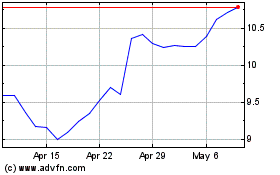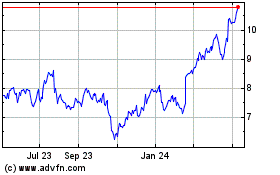By Ese Erheriene
LONDON -- ICBC Standard Bank PLC said on Monday it is buying a
precious-metals vault from Barclays PLC's, in the latest move by
the Chinese bank to increase its role in the market's
infrastructure.
The move makes parent ICBC, the world's biggest bank by assets,
the first Chinese lender to own a vault in London and extends its
influence in precious metals from pricing to storage. With China
the largest consumer of many metals, the country's banks have
increasingly bid to own or help run the infrastructure in these
markets.
China accounts for more than a quarter of global gold demand,
but trading in the metal was until recently largely run out of
western banks and in markets such as London and New York.
The vault gives ICBC a high profile platform in the precious
metals market. It also makes it easier for the bank to sells its
services to western-based clients given that it now has a location
to store metals that is closer to them.
With "London being the place where a lot of the bullion is
traded, especially from an institutional perspective, it makes
sense for them," said Mark O'Byrne, director at Dublin-based
brokers GoldCore. "Some people, particularly Western buyers, might
be more inclined to have their gold stored in London than have
their gold stored in China."
The vault holds up to 2,000 metric tons in gold, silver,
platinum and palladium at a secret location in London and can be
used by investors, jewelers, miners and even countries to store
their metal.
Vaults are particularly important to trading precious metals
because they have fewer industrial uses than the likes of copper or
lead and are held mainly as a store of value. The constant trading
in and out of positions, coupled with the sheer value of large
quantities of the metals, mean that it is best to hold them in a
vault. That is particularly so for gold because of the importance
of exchange-traded funds in the sector, most of which need to sit
on large quantities of physical gold to back up the investment they
sell and who are required by regulators to store it with banks.
For ICBC Standard Bank, owning a vault gives an extra reason for
clients to use their services while also bringing in a steady
revenue from the fees holding the metals bring.
"To [be able to] say that we are a bank with a storage facility
in the London area, it allows you to maybe get some of this
institutional money from ETFs and other products," said Jeffrey
Christian, managing partner at CPM Group.
There are seven providers of vault services to the London
bullion market, including the Bank of England and HSBC PLC. No
financial details were disclosed on the deal, which is expected to
be completed in July.
"This enables us to better execute on our strategy to become one
of the largest Chinese banks in the precious metals market." Mark
Buncombe, head of commodities at ICBC Standard Bank, said of
Monday's deal.
ICBC Standard Bank, which was formed after the Chinese bought a
majority stake in the markets operation of Standard Bank PLC in
2015, has made a big push into precious metals markets this
year.
In June, it will become the first new bank in over a decade to
join the organization that administers the London precious metals
clearing system, where members settle trades and provide credit to
clients.
ICBC also recently became the 13th bank that submit prices to
help set the London Bullion Market Association's twice-daily gold
price benchmark. The Bank of China and China Construction Bank
already help set the benchmark.
In March, China Construction Bank became the first Chinese
participant in setting the LBMA's benchmark silver price.
These banks have expanded research and trading teams into
London, marketing to clients across Europe.
Trading of metals is also ballooning at home in China. Chinese
investors have become the dominant force in iron ore, while trading
in futures for the steel rebar used in construction and copper have
boomed in Shanghai.
London though, remains the major center for gold trading. Around
407 million ounces net of gold was settled between members of the
London Bullion Metal Association in March, according to data from
the association.
"If you want to be a dominate player in gold, then it would make
sense for you to have some involvement [in London]," said Adrian
Ash, head of research at BullionVault, an online bullion
marketplace.
Barclays opened its vault in 2012 just as the price of gold was
declining after a decade of steep gains.
In recent years Barclays, like many others, has been moving out
of the precious metals market. The British bank announced in late
January that it was exiting metal trading, following in the wake of
several high-profile banks and trading houses, including Deutsche
Bank AG and Switzerland-based Gunvor Group.
In 2014, Barclays moved much of its commodities exposure to a
noncore unit, as part of a continuing effort to make the bank
smaller and more focused. A slew of bank regulations since the
financial crisis meant that the bank, along with others,
increasingly found it difficult to make money from low-margin
global commodities trading.
Margot Patrick contributed to this article.
Write to Ese Erheriene at ese.erheriene@wsj.com
(END) Dow Jones Newswires
May 16, 2016 14:30 ET (18:30 GMT)
Copyright (c) 2016 Dow Jones & Company, Inc.
Barclays (NYSE:BCS)
Historical Stock Chart
From Mar 2024 to Apr 2024

Barclays (NYSE:BCS)
Historical Stock Chart
From Apr 2023 to Apr 2024
